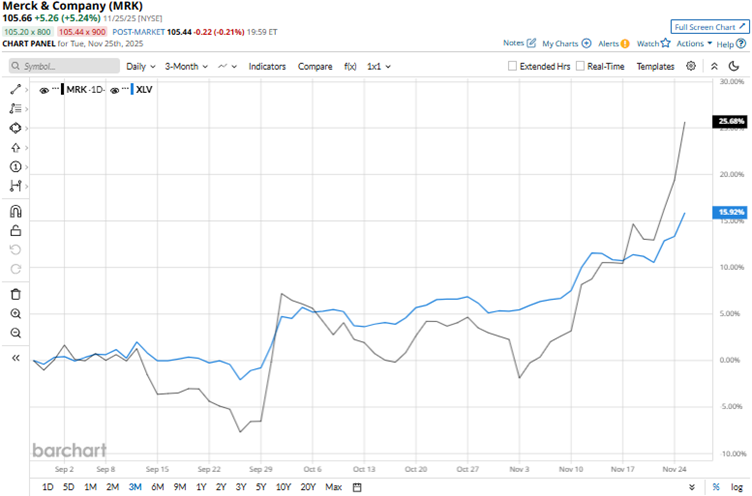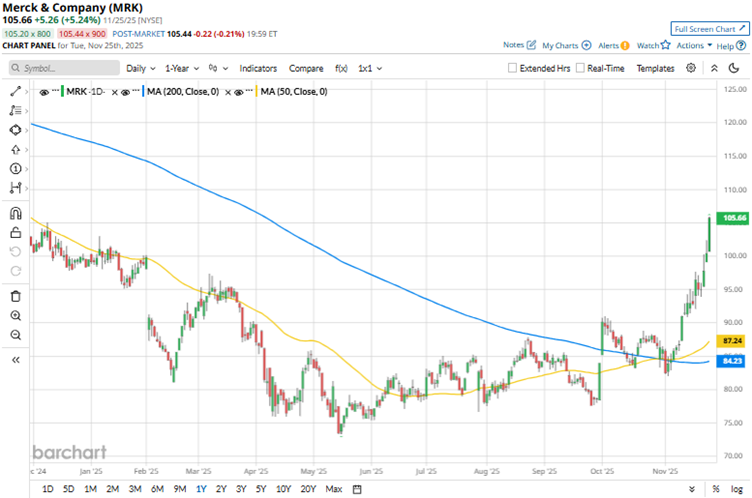Merck & Co., Inc. (MRK) is a leading global healthcare company specializing in the research, development, and distribution of prescription medicines, vaccines, and animal health products. Its operations are divided into two main segments: Pharmaceuticals, which focuses on human medicines and vaccines for various health conditions, and Animal Health, which provides veterinary products to ensure animal well-being.
Headquartered in Rahway, New Jersey, Merck serves a worldwide market, leveraging innovation and robust R&D to address diverse health challenges effectively. With a market capitalization of $249.20 billion, the company can be classified as a “mega-cap” stock.
Merck’s stock reached a 52-week high of $105.84 on Nov. 25, after Wells Fargo analyst Mohit Bansa raised the company’s rating to “Overweight,” seeing a future beyond its flagship drug Keytruda, and is down only marginally from that level. Over the past three months, Merck’s stock has gained 23.9%. On the other hand, the Health Care Select Sector SPDR Fund (XLV) has gained 16.6% over the same period. Therefore, Merck has outperformed its peers in the sector.

Over the longer term, an ambiguity manifests. Over the past 52 weeks, Merck’s stock increased by 4.5%, underperforming XLV’s 9.2% gain over the same period. On the other hand, the stock is up by 36.2% over the past six months, outperforming the ETF’s 21.8% gains. The stock has been trading above its 50-day and 200-day moving averages since early November.

On Oct. 30, Merck announced sound growth in its third-quarter results for fiscal 2025. The company’s sales increased by 4% year-over-year (YOY) to $17.28 billion, marginally above the $17.06 billion expected by Wall Street analysts. Despite the solid results, Merck’s stock dropped marginally intraday on Oct. 30 and Oct. 31.
This topline growth was driven by a 4% annual increase in pharmaceutical sales, to reach $15.61 billion, driven by growth in the oncology, cardiovascular, and diabetes segments. Merck’s adjusted EPS increased by a robust 64% YOY to $2.58, above analysts’ $2.36 predicted figure. The company also highlighted its Verona Pharma acquisition and expanded spending in R&D and U.S. manufacturing as potential tailwinds.
We compare Merck’s performance with that of another pharma giant, Pfizer Inc. (PFE), which has declined 1.7% over the past 52 weeks but gained 10.3% over the past six months. Therefore, Merck has been the clear outperformer over these periods.
Wall Street analysts are moderately bullish on Merck’s stock. The stock has a consensus rating of “Moderate Buy” from the 26 analysts covering it. The mean price target of $104.83 indicates a marginal downside compared to current levels. However, the Street-high price target of $139 indicates a 31.6% upside.
On the date of publication, Anushka Mukherjee did not have (either directly or indirectly) positions in any of the securities mentioned in this article. All information and data in this article is solely for informational purposes. For more information please view the Barchart Disclosure Policy here.
More news from Barchart





